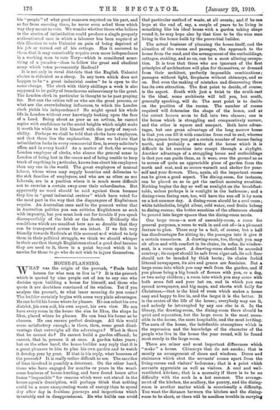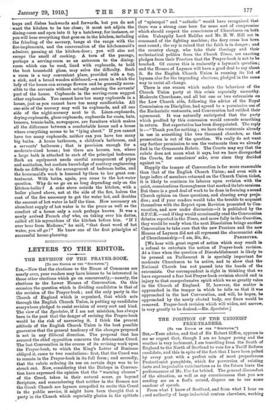HOUSE-PLANNING.
WHAT was the origin of the proverb, " Fools build houses for wise men to live in" ? It is the proverb which is quoted by nine people out of ten to any one who decides upon building a house for himself, and those who quote it are doubtless convinced of its wisdom. Yet if you analyse the proverb, to what inner meaning do you come? The builder certainly begins with some very plain advantages. He can build his house where he pleases. He can select his own district, his own soil, his own aspect, his own view. He can have every room in the house the size he likes, the shape he likes, placed where he pleases. He can heat his house as he chooses. He can ensure perfect drainage. All this would seem satisfactory enough ; is there, then, some great disad- vantage that outweighs all the advantages? What is there that he cannot do ? He cannot build a garden offhand; he cannot, that is, possess it at once. A garden takes years ; but on the other hand, the house-builder may reply that it is a great pleasure to him to plan his own garden and to watch it develop year by year. If that is his reply, what becomes of the proverb ? It is really rather difficult to see. The sacrifice of time involved is possibly a deterrent. On the other hand, those who have engaged for months or years in the weari- some business of house-hunting, and have found house after house " impossible " for reasons which were not stated in the house-agent's description, will perhaps think that nothing could be a more exasperating waste of energy than to spend day after day in fruitless journeys and inspections which invariably end in disappointment. He who builds can avoid
that particular method of waste, at all events; and if he can hope at the end of, say, a couple of years to be living in something like his ideal house with a garden taking shape round it, he may hope also by that time to be the wise man living in the house built by the proverbial builder.
The actual business of planning the house itself, and the situation of the rooms and passages, the approach to the house from the road, and the arrangement of the outbuildings, cottages, stabling, and so on, can be a most alluring occupa- tion. It is true that those who are ignorant of the first principles of architecture will plan for themselves, or demand from their architect, perfectly impossible combinations ; passages without light, fireplaces without chimneys, and so on. But even the making of mistakes and discovering them has its own attraction. The first point to decide, of course, is the aspect. South with just a twist to the south-east is the ideal, some architects will tell you, but south, generally speaking, will do. The next point is to decide on the position of the rooms. The number of rooms required will determine the shape of the house, and at the outset houses seem to fall into two classes; one is the house which is straggling and comparatively narrow, and the other is square and compact. Both have advan- tages, but one great advantage of the long narrow house is that you can fill it with sunshine from end to end, whereas in the square house you get a certain number of rooms facing north, and probably a centre of the house which it is difficult to let sunshine into except through a skylight. Another advantage of a straggling house and outbuildings is that you can guide them, as it were, over the ground so as to screen off quite an appreciable piece of garden from the north and east, and so secure warmth and shelter for your- self and your flowers. Then, again, all the important rooms can be given a good aspect. The dining-room, for instance, can be placed so as to get the earliest morning sunshine. Nothing begins the day so well as sunlight on the breakfast- table, unless perhaps it is sunlight in the bathroom ; and a dining-room facing east, too, will have the sun off it by noon on a hot summer day. A dining-room should be a cool room; white tablecloths, bright silver, cold water, cool fruits belong to dining-rooms; the hotter sunshine of the afternoon should be poured into larger spaces than the dining-room needs.
One large room—a sort of assembly-room, a room for general purposes, a room to walk in and out of—is a pleasant feature to plan. There may be a hall, of course, but a hall has disadvantages for sitting in; the passages into it give it a certain uneasiness. A drawing-room, too, though you may sit often and with comfort in its chairs, its sofas, its window- seat, is a room apart. A drawing-room should be accorded courtesy ; its carpet should be safe from cigar-ash, its oak floor should not be invaded by thick boots ; its chairs forbid littered newspapers, its airs and graces are feminine. But a large room into which you may walk from the garden, and if you please bring a big bunch of flowers with you, or a dog, or two noisy children ; a room into which you may come with both arms full and your hat on, and in which you can spread newspapers, and big maps, and sheets with holly for Christmas,—that is the kind of room which makes a house easy and happy to live in, and the larger it is the better. It is the centre of the life of the house; everybody may use it, and nobody be interrupted by any one else in it. In the library, the drawing-room, the dining-room there should be quiet and separation, but the large room is the most acces- sible in the house, the most hospitable, and the most inviting. The aura of the house, the indefinable atmosphere which is the expression and the knowledge of the character of the people who live in the house the year round, will be found most surely in the large room.
There are minor and most important differences which " make " a house. Chimneys that do not smoke ; that is mostly an arrangement of doors and windows. Doors and staircases which shut the servants' rooms apart from the living-rooms and visitors' bedrooms ; that is a point which servants appreciate as well as visitors. A cool and well- ventilated kitchen; that is a necessity if there is to be no difficulty with the cook in a hot summer. The arrange- meat of the kitchen, the scullery, the pantry, and the dining- room is another matter which is occasionally a difficulty. You want the distance between the kitchen and the dining. room to be short, or there will be needless trouble in carrying
trays and dishes backwards and. forwards, but you do not want the kitchen to be too close; it must not adjoin the dining-room and open into it by a hatchway, for instance, or you will hear everything that goes on in the kitchen, including the frizzling of the savoury, bangs at the range with the fire-implements, and the conversation of the kitohenmaid's admirer, pausing at the kitchen-door; you will also not escape the smell of cooking. A turn of the passage, perhaps a serving-room as an anteroom to the dining- room which can be used, lined with cupboards, to hold the best household glass, may solve the difficulty. Such a room is a very convenient place, provided with a tap, a sink, and a broad wooden sideboard,—a room in which the lady of the house can arrange flowers and be generally acces- sible to the servants without actually entering the servants' part of the house. Cupboards in the serving-room suggest other cupboards. You cannot have too many cupboards in a house, just as you cannot have too many candlesticks. All one side of the nursery may well be cupboards, and all one side of the night-nursery next to it. Linen-cupboards, drying-cupboards, glass-cupboards, cupboards for coats, hats, brooms, tennis-balls, newspapers, are furniture which makes all the difference between a comfortable house and a house where everything seems to be "lying about." If you cannot have too many cupboards, neither can you have too many big baths. A house bathroom, a children's bathroom, and a servants' bathroom ; that is provision enough for a moderate-sized house ; but there are houses, too, where a large bath is attached to each of the principal bedrooms. Such an equipment needs careful arrangement of pipes and sanitation, but modern knowledge of sanitary engineering finds no difficulty in the arrangement of bedroom baths, and the housemaid's work is lessened by them to her great con- tentment. With baths, again, you come to the hot-water question. Why do we go on so long depending only on the kitchen-boiler? A coke stove outside the kitchen, with a boiler placed above, not at the side of the fire, halves the cost of the fire necessary to get the water hot, and doubles the amount of hot water in half the time. How necessary an abundant supply of hot water is to the peace as well as the comfort of a house only a cook perhaps knows. It was a newly arrived French chef who, on taking over his duties, called all his myrmidons of the kitchen before him. "If I ever hear from Madame," he said, "that damt word of hot water, you all go !" He knew one of the first principles of successful house-planning.























































 Previous page
Previous page